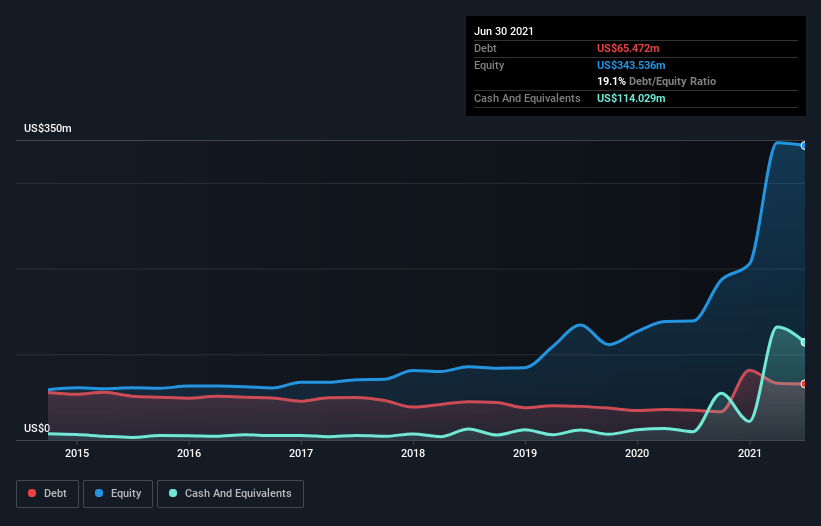Is Village Farms International (TSE:VFF) Using Debt In A Risky Way?
The external fund manager backed by Berkshire Hathaway's Charlie Munger, Li Lu, makes no bones about it when he says 'The biggest investment risk is not the volatility of prices, but whether you will suffer a permanent loss of capital.' So it seems the smart money knows that debt - which is usually involved in bankruptcies - is a very important factor, when you assess how risky a company is. Importantly, Village Farms International, Inc. (TSE:VFF) does carry debt. But should shareholders be worried about its use of debt?
When Is Debt Dangerous?
Debt and other liabilities become risky for a business when it cannot easily fulfill those obligations, either with free cash flow or by raising capital at an attractive price. Part and parcel of capitalism is the process of 'creative destruction' where failed businesses are mercilessly liquidated by their bankers. However, a more frequent (but still costly) occurrence is where a company must issue shares at bargain-basement prices, permanently diluting shareholders, just to shore up its balance sheet. By replacing dilution, though, debt can be an extremely good tool for businesses that need capital to invest in growth at high rates of return. When we examine debt levels, we first consider both cash and debt levels, together.
See our latest analysis for Village Farms International
How Much Debt Does Village Farms International Carry?
The image below, which you can click on for greater detail, shows that at June 2021 Village Farms International had debt of US$65.5m, up from US$34.7m in one year. However, its balance sheet shows it holds US$114.0m in cash, so it actually has US$48.6m net cash.
A Look At Village Farms International's Liabilities
We can see from the most recent balance sheet that Village Farms International had liabilities of US$66.8m falling due within a year, and liabilities of US$77.1m due beyond that. Offsetting this, it had US$114.0m in cash and US$42.1m in receivables that were due within 12 months. So it actually has US$12.3m more liquid assets than total liabilities.
This state of affairs indicates that Village Farms International's balance sheet looks quite solid, as its total liabilities are just about equal to its liquid assets. So while it's hard to imagine that the US$752.6m company is struggling for cash, we still think it's worth monitoring its balance sheet. Succinctly put, Village Farms International boasts net cash, so it's fair to say it does not have a heavy debt load! There's no doubt that we learn most about debt from the balance sheet. But ultimately the future profitability of the business will decide if Village Farms International can strengthen its balance sheet over time. So if you want to see what the professionals think, you might find this free report on analyst profit forecasts to be interesting.
Over 12 months, Village Farms International reported revenue of US$213m, which is a gain of 41%, although it did not report any earnings before interest and tax. Shareholders probably have their fingers crossed that it can grow its way to profits.
So How Risky Is Village Farms International?
We have no doubt that loss making companies are, in general, riskier than profitable ones. And we do note that Village Farms International had an earnings before interest and tax (EBIT) loss, over the last year. Indeed, in that time it burnt through US$26m of cash and made a loss of US$4.4m. With only US$48.6m on the balance sheet, it would appear that its going to need to raise capital again soon. Village Farms International's revenue growth shone bright over the last year, so it may well be in a position to turn a profit in due course. Pre-profit companies are often risky, but they can also offer great rewards. There's no doubt that we learn most about debt from the balance sheet. But ultimately, every company can contain risks that exist outside of the balance sheet. We've identified 1 warning sign with Village Farms International , and understanding them should be part of your investment process.
At the end of the day, it's often better to focus on companies that are free from net debt. You can access our special list of such companies (all with a track record of profit growth). It's free.
This article by Simply Wall St is general in nature. We provide commentary based on historical data and analyst forecasts only using an unbiased methodology and our articles are not intended to be financial advice. It does not constitute a recommendation to buy or sell any stock, and does not take account of your objectives, or your financial situation. We aim to bring you long-term focused analysis driven by fundamental data. Note that our analysis may not factor in the latest price-sensitive company announcements or qualitative material. Simply Wall St has no position in any stocks mentioned.
Have feedback on this article? Concerned about the content? Get in touch with us directly. Alternatively, email editorial-team (at) simplywallst.com.

 Yahoo Finance
Yahoo Finance 
